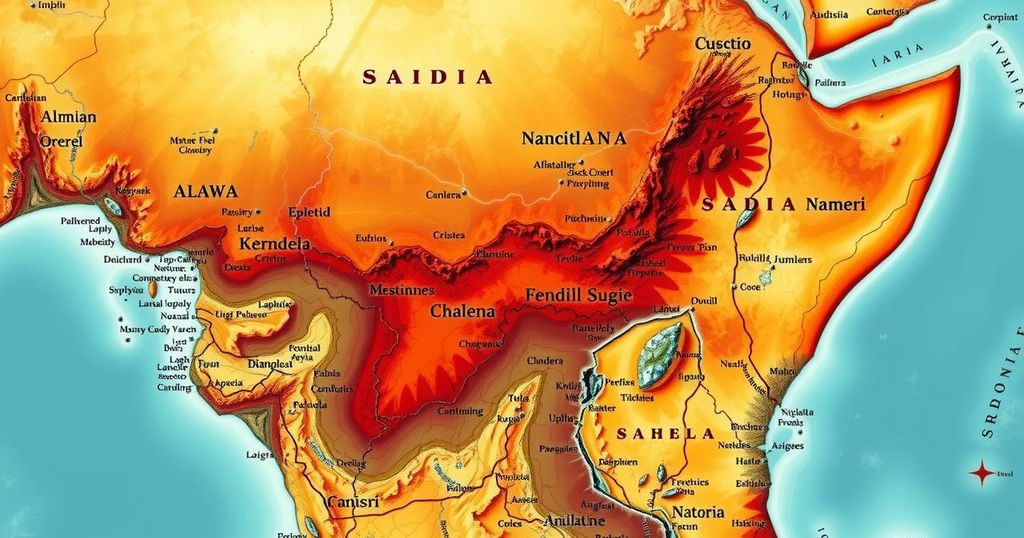Togo Considers Joining Sahel Bloc as ECOWAS Weakens

Togo is exploring membership in the Alliance of Sahel States (AES), potentially diminishing ECOWAS’s influence. With foreign minister Robert Dussey indicating interest, the new alignment might provide economic and security benefits for Togo and the Sahel nations. However, this shift raises concerns about governance and democracy in Togo while potentially accelerating ECOWAS’s decline. Togo’s decisions could reshape regional power dynamics.
Togo is indicating a possible shift in West African geopolitics with an exploration of membership in the Alliance of Sahel States (AES), which includes military-led nations Mali, Burkina Faso, and Niger. This realignment could further diminish the influence of the Economic Community of West African States (ECOWAS), which is already weakened by the departure of these three Sahelian countries.
Togo’s Foreign Minister, Robert Dussey, has expressed interest in the AES. He initially stated in January that membership was “not impossible” and elaborated recently through social media, noting that this decision could bolster regional cooperation and improve access to maritime resources for member states. Togo’s coastal access via Lomé holds significant potential for landlocked nations grappling with economic challenges and security threats.
The Sahelian nations, facing various jihadist insurgencies, could benefit from Togo’s port facilities, as trade has already begun shifting towards Togo amidst increasing tensions with ECOWAS member states such as Ivory Coast and Benin. Analysts suggest that formalizing this partnership could yield economic advantages, including enhanced access to Nigerien oil and support for renewed trade routes. Togolese political analyst Madi Djabakate has highlighted the potential for “more agile military cooperation, intelligence sharing with its neighbours.”
Tensions in northern Togo, where attacks by militant groups linked to al-Qaeda and the Islamic State have escalated, underscore the urgency for stronger security measures. The AES, which initially focused on defense, has pledged to establish a unified military force, aligning with Togo’s escalating security priorities. Togo’s engagement with the AES also reflects a broader pan-African ideology, with Djabakate emphasizing the significance of nations uniting against historical divisions.
Domestic political factors may also play a role in Togo’s potential shift. President Faure Gnassingbé, who has been in power since 2005, faces criticism regarding changes to the constitution that opposition factions argue could extend his leadership indefinitely. Realigning with the AES, which has resisted Western-sponsored democratic reforms, could provide protection for Togo’s governance amid regional pressures concerning human rights and democracy.
Opposition leader Nathaniel Olympio has expressed concerns regarding Togo’s transition to the AES, suggesting that it might shield the government from ECOWAS accountability regarding rule of law and freedoms. Amidst ECOWAS’s challenges, following the exit of Mali, Niger, and Burkina Faso, Togo might still uphold a dual relationship with ECOWAS, as Djabakate posits that alliances can function as partnerships without necessitating complete commitment.
However, the prospective membership may accelerate the decline of ECOWAS, as noted by Seidik Abba, head of the International Center for Studies and Reflections on the Sahel, who cautioned that Togo’s alignment with the AES would exacerbate the bloc’s existing vulnerabilities. Togo’s forthcoming decisions could crucially influence West Africa’s political landscape, determining whether ECOWAS achieves stability or further cedes influence to the emerging Sahel bloc.
In conclusion, Togo’s intention to join the Alliance of Sahel States indicates a significant geopolitical shift that could undermine the influence of ECOWAS. This potential alliance could offer Togo and its Sahelian counterparts economic and security benefits, while simultaneously raising concerns regarding governance and adherence to democratic principles within Togo itself. The region’s political stability hangs in the balance as Togo’s decisions in the coming months may further delineate the power dynamics between ECOWAS and the Sahel bloc.
Original Source: www.pulse.ng








